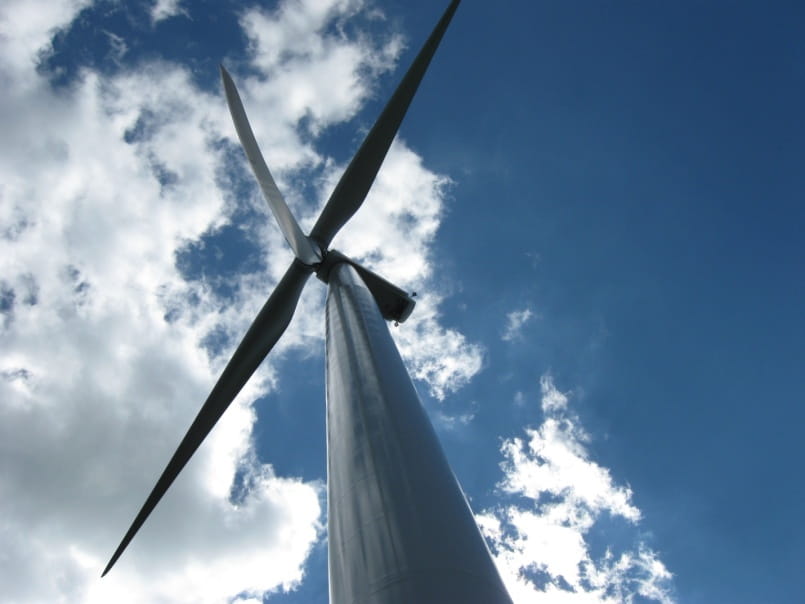The web Browser you are currently using is unsupported, and some features of this site may not work as intended. Please update to a modern browser such as Chrome, Firefox or Edge to experience all features Michigan.gov has to offer.
EGLE gathers input for MI Healthy Climate Plan and federal climate grant opportunity
November 27, 2023
A funding opportunity through the U.S. Environmental Protection Agency (EPA) has Michigan climate action proponents seeking public input statewide.

Wind turbine in Michigan.
The EPA’s $5 billion Climate Pollution Reduction Grants (CPRG) program has opened its highly competitive Implementation Grants General Competition, funded by the federal Inflation Reduction Act. Applicants must present implementation-ready projects in a Priority Climate Action Plan (PCAP) that includes a full analysis of potential emissions reductions, community and workforce impacts, and other benefits.
The State of Michigan already received a $3 million CPRG planning grant to refine and implement the MI Healthy Climate Plan (MHCP) and prepare Michigan communities to compete in the nationwide competition for federal Implementation Grants. In addition, the EPA has awarded $1 million to each of the 67 most populous metropolitan statistical areas in the country, including Grand Rapids-Kentwood and Detroit-Warren-Dearborn in Michigan.
To identify priorities to be included as a part of the state’s PCAP and further inform the implementation of the MHCP, the Office of Climate and Energy (OCE) in Michigan’s Department of Environment, Great Lakes, and Energy (EGLE) is requesting project or program ideas from eligible applicants that are interested in pursuing funds through the EPA competition. Eligible applicants include local, county, regional, and state government agencies. Nonprofits and nongovernmental organizations are not eligible to be applicants or coalition members but may be partners in implementation.
Registration is open for a series of stakeholder engagement meetings to gather public feedback on climate projects and priorities:
- Nov. 29 in Detroit in partnership with Southeast Michigan Council of Governments at the Zero Net Energy Center, 1358 Abbott St.
- Nov. 30 in Grand Rapids in partnership with Grand Valley Metro Council at the Daniel and Pamella DeVos Center for Interprofessional Health, 333 Michigan St. NE.
- Dec. 5 in Flint, at the Old Flint Journal Building, 200 E. First St., Room 132.
- Dec. 6 in Marquette, at Northern Michigan University, 1401 Presque Isle Ave.
- Dec. 12 in Petoskey, at North Central Michigan College, 1515 Howard St.
- Dec. 14 online.
- Dec. 18 online.
Each session is scheduled from 6-8 p.m. Eastern Standard Time. Comments or questions also can be submitted to EGLE’s Office of Climate and Energy (OCE) at EGLE-OCE@Michigan.gov.
A Call for Projects is also available for anyone to submit project ideas that help achieve key strategies listed in the MHCP’s Roadmap to 2030, a set of benchmarks – for environmental justice, clean energy, vehicle electrification and public transportation, decarbonizing homes and businesses, clean innovation in industry, and protection for land and water – on Michigan’s pathway to 100% carbon neutrality by 2050.
“The MI Healthy Climate Plan launched in 2022 with the benefit of a year of productive input from hundreds of Michiganders,” said Cory Connolly, Michigan Climate and Energy advisor in the OCE. “It’s fitting that residents continue to engage with its implementation throughout the state.”
The state’s PCAP is due March 1, 2024, implementation grant applications are due April 1, 2024, and the PCAP will be followed by work on a Comprehensive Climate Action Plan (CCAP) through July 2025.
The state is prioritizing feasible near-term projects with a high impact on greenhouse gas (GHG) reduction. Project ideas that are applicable across regions or brought forward by coalitions of eligible applicants will be favorably considered.
The state’s PCAP also will focus on maximizing emissions reductions over the next several years to meet the Roadmap to 2030 target of reducing economywide GHG emissions by up to 52%.
To develop the state’s PCAP, EGLE and the OCE are coordinating with entities across state, local, and tribal governments; advisory bodies; key stakeholders, including low-income disadvantaged communities that may be impacted; and the public.
The state’s PCAP will include a preliminary GHG inventory, a summary of Michigan’s existing GHG reduction targets, quantified GHG reduction measures to help prioritize actions in the PCAP aligned with the MHCP, benefits analyses including for low-income disadvantaged communities, and more.
The state’s CCAP will work toward the 2050 carbon neutrality goal, leveraging the stakeholder engagement and prioritization process that went into the development of the MHCP and the PCAP.
About the CPRG
The EPA program provides states, local governments, and tribal nations flexible resources to plan for and pursue ambitious GHG pollution reductions to achieve three broad objectives:
- Tackle damaging climate pollution while supporting the creation of good jobs and lowering energy costs for families.
- Accelerate work to address environmental injustices and empower community-driven solutions in overburdened neighborhoods.
- Deliver cleaner air by reducing harmful pollution in places where people live, work, play, and go to school.
Additional resources
- MI Healthy Climate Plan Hub for more on CPRG, current initiatives, and how to get involved.
- Council on Climate Solutions: Workgroup Recommendations.
- MI Healthy Climate Webinar on leveraging CPRG funds, recorded Oct. 10, 2023.
- EGLE's CPRG informational webpage.